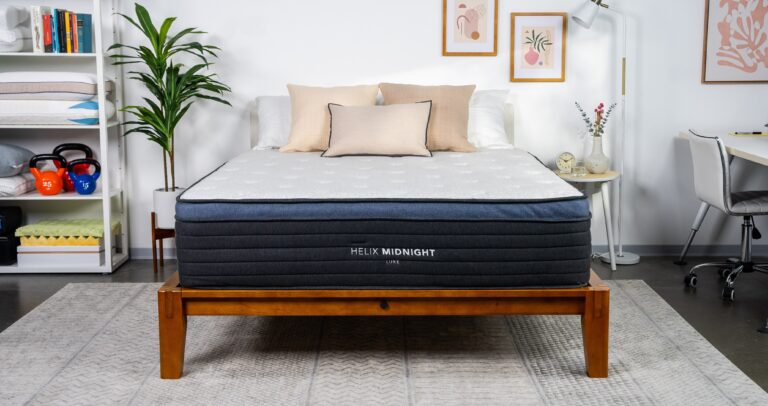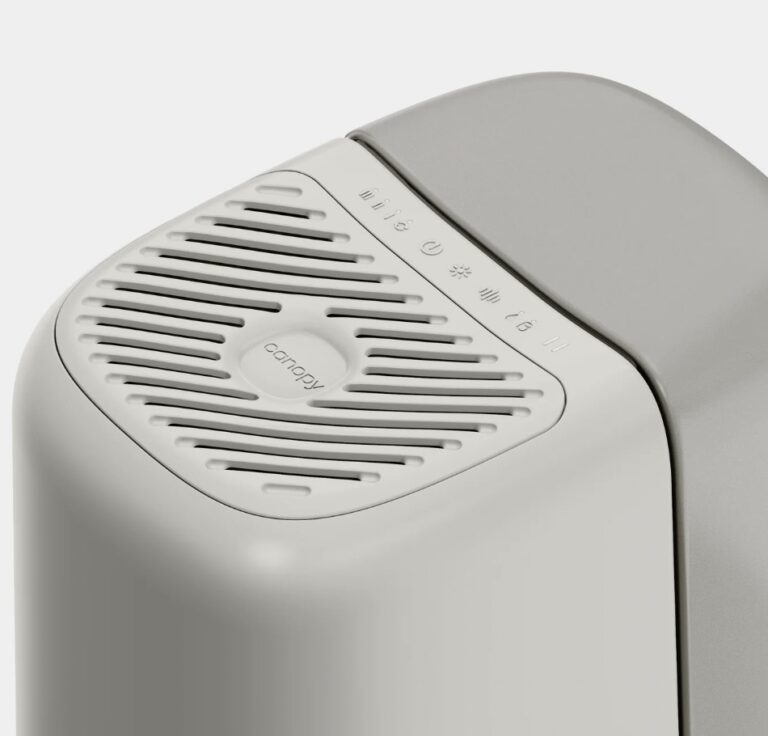When you buy through our links, we may earn a commission. Products or services may be offered by an affiliated entity. Learn more.
Why Do I Wake Up With a Stuffy Nose?
If you wake up with a stuffy nose, your first thought might be that you are getting sick. While the cold and flu can cause nasal congestion, also known as rhinitis, there are a range of other reasons why your nose might feel plugged up in the morning.
Studies have found that nasal congestion can disrupt your sleep. Additionally, ongoing nasal congestion can contribute to snoring, which may affect the sleep of bed partners. To help you reduce morning stuffiness and get better sleep, we describe the causes of morning stuffiness, ways to prevent a stuffy nose, and tips for relieving morning congestion.
Looking to improve your sleep? Try upgrading your mattress.
Causes of Morning Congestion
A stuffy nose is caused by inflammation and a buildup of mucus in the nose and sinuses, which reduces airflow and contributes to the sensation of blocked nasal passages. Congestion is most often caused by illness or allergies, but can result from many other factors, including pregnancy and small growths called polyps in the nasal passage.
Cold or Flu
Common illnesses that can cause a stuffy nose include colds and the flu. When a person catches the common cold or influenza, their body may attempt to clear the infection by producing mucus. Mucus and inflammation triggered by the infection lead to the feeling of a stuffy nose.
Allergies
People can have allergies to a variety of airborne particles, including dust, pollen, and animal dander. When a person breathes in something they are allergic to, an immune response can lead to a variety of symptoms, including a stuffy nose, called allergic rhinitis. Up to 30% of adults and 40% of children experience allergic rhinitis. Allergic rhinitis may reduce a person’s sleep quality and cause them to feel fatigued during the day.
Nonallergic Rhinitis
People can sometimes experience nasal congestion, sneezing, or runny nose that appears similar to allergies but has a separate cause. Triggers of nonallergic rhinitis include:
- Weather or temperature changes
- Medications, including drugs used to treat heart conditions, erectile dysfunction, and depression or anxiety
- Alcohol
- Strong emotions
- Smoke, perfumes, and other strong smells
- Spicy foods
- Medical conditions such as cystic fibrosis and hypothyroidism
Sinus Infection
A buildup of mucus in the nasal passages can be a breeding ground for bacteria or viruses, potentially leading to a sinus infection. Sinus infections often cause a stuffy nose and additional symptoms. Pain in the face and headaches are additional signs a stuffy nose might be due to a sinus infection, but the only way to be sure is to see a doctor.
Nasal Polyps
Sometimes the blockage that causes the feeling of a stuffy nose is due to small growths called nasal polyps in the lining of the nose and sinuses. A person with small nasal polyps may not notice any symptoms . Larger polyps may make it difficult to breathe through the nose, increase the risk of a sinus infection, and leave a person constantly feeling like they have a cold.
Pregnancy
Up to 30% of pregnant people experience nasal congestion. A stuffy nose during pregnancy occurs as a result of a normal increase in blood flow and changes in hormones. Rhinitis can also develop during pregnancy due to new or existing allergies, medications, or other causes. It also may develop on its own, without any illness or allergic cause, during the last two months of pregnancy.
How to Prevent Waking Up With a Stuffy Nose
If you are trying to avoid waking up with a stuffy nose, there are a variety of measures you can take at home to help keep your nose and sinuses clear.
- Stay healthy: The best way to avoid getting sick is to minimize your exposure to germs. This includes washing your hands often with soap and water and trying not to touch your face.
- Avoid triggers:Reducing exposure to any triggers that exacerbate your nasal congestion can help reduce the chance of waking up with a stuffy nose. This includes limiting exposure to things like cigarette smoke or strong fragrances.
- Elevate your head: Lying down can worsen nasal congestion, so sleeping with your head elevated can help alleviate the feeling of a stuffy nose when you wake up.
- Warm compress: Since heat can help open up your sinuses, applying a warm, dampened cloth on your face can help reduce nasal congestion.
- Stay hydrated: Drinking plenty of fluids can help keep the mucus thin, allowing you to clear it more easily from the nose and sinuses.
- Nasal wash: Rinsing your nose 3 to 4 times a day with a simple saline solution from the local drugstore can help to reduce mucus. You can also make your own saltwater solution at home.
- Sleep with a humidifier: Using a humidifier can help keep the air in your room from being too dry. The added humidity can help thin the mucus in your nasal passages while you sleep to help you wake up with a clear nose.
- Inhale steam: Similar to a nasal wash or warm compress, inhaling steam can help thin mucus so you can breathe easier.
- Over-the-counter medications: Decongestant medications can help dry out the nasal passages to relieve a stuffy nose. If you experience allergies, antihistamines may prevent the symptoms, including a stuffy nose, from coming on. Antihistamine nasal sprays may also help people with nonallergic rhinitis. Working with a doctor can help you decide whether a medication may be helpful for you.
When to Talk to Your Doctor
While in most cases a stuffy nose is not a cause for concern, if the feeling lasts for more than three weeks , it might be time to talk to a doctor. There are also several additional symptoms that can appear alongside a stuffy nose that are signs it would be good to talk to your doctor:
- Pain in the face or throat
- Facial swelling and blurred vision
- Fever
- Nasal discharge that is green, yellow, or any color other than white or clear
- A runny nose on only one side or that starts after a head injury
- Foul smelling nasal discharge
- A persistent cough for longer than 10 days
Your doctor can help identify the underlying cause of the stuffy nose and provide treatments, such as prescription nasal sprays, that can help speed your recovery.

Still have questions? Ask our community!
Join our Sleep Care Community — a trusted hub of sleep health professionals, product specialists, and people just like you. Whether you need expert sleep advice for your insomnia or you’re searching for the perfect mattress, we’ve got you covered. Get personalized guidance from the experts who know sleep best.
References
6 Sources
-
Fried, M. P. (2021, September). Nasal congestion and rhinorrhea. Merck Manual Professional Version., Retrieved January 31, 2023, from
https://www.merckmanuals.com/professional/ear,-nose,-and-throat-disorders/approach-to-the-patient-with-nasal-and-pharyngeal-symptoms/nasal-congestion-and-rhinorrhea -
Peden, D. (2022, April 25). An overview of rhinitis. In J. Corren (Ed.). UpToDate. Retrieved August 22, 2022 from, Retrieved January 30, 2023, from
https://www.uptodate.com/contents/an-overview-of-rhinitis -
A.D.A.M. Medical Encyclopedia.. (2021, August 31). Nasal polyps. MedlinePlus., Retrieved January 30, 2023, from
https://medlineplus.gov/ency/article/001641.htm -
Office on Women’s Health. (2021, February 22). Body changes and discomforts. U.S. Department of Health & Human Services., Retrieved January 31, 2023, from
https://www.womenshealth.gov/pregnancy/youre-pregnant-now-what/body-changes-and-discomforts -
Lieberman, P. L. (2022, April 26). Chronic nonallergic rhinitis. In J. Corren (Ed.). UpToDate., Retrieved January 30, 2023, from
https://www.uptodate.com/contents/chronic-nonallergic-rhinitis -
A.D.A.M. Medical Encyclopedia. (2021, July 19). Stuffy or runny nose – adult. MedlinePlus., Retrieved January 30, 2023, from
https://medlineplus.gov/ency/article/003049.htm












